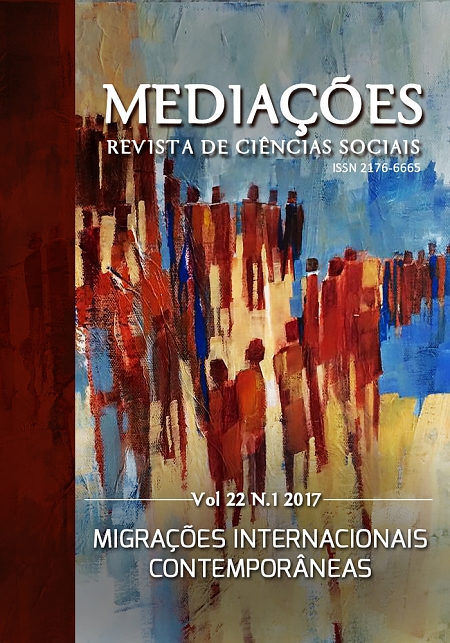Women on the left and right: political careers and political parties
DOI:
https://doi.org/10.5433/2176-6665.2017v22n1p350Keywords:
Women, Parties, Political CareerAbstract
The objective of this article is to identify the socioeconomic and political profiles of federal deputies elected in 2014. It is intended to answer the following questions: What are the parties that managed to elect women? There are significant differences concerning the ideological spectrum? How did the distribution of these parliamentarians in the States? What is the profile of the elected in level of education, age and profession? How the time of party affiliation relates to women of different parties? Have family relationships with established policy is an important feature in this group? Our main hypothesis corroborates the thesis already established in the literature that the parliamentary left parties run a long history within the same party, and to win a position as a federal deputy, these politicians go before other positions, such as councilors, state legislators and sometimes mayors (SANTOS E SIERNA, 2007; MIGUEL, 2003). On the other hand, the center parties and right, you can see the use of shortcuts, such as accumulated political capital by other individuals and shared by family relationships, so that success in political office is at an early stage.Downloads
References
BRAGA, S. S. Quem foi quem na Assembléia Nacional Constituinte de 1946 : um perfil socioeconômico e regional da Constituinte de 1946. Brasília: Câmara dos Deputados, Coordenação de Publicações, 1998.
BOURDIEU, P. A representação política. Elementos para uma teoria do campo político. In: O poder simbólico. Lisboa : Difel. DUVERGER, M. (1980). Os partidos políticos. São Paulo, Zahar, 1986.
KATZ, R.; MAIR, P. Changing models of party organization and party democracy: the emergence of the carte party. Party Politics, n. 1, v. 1, 1995.
KIRCHHEIMER, O. A transformação dos sistemas partidários da Europa Ocidental. Tradução Paulo Peres. Revista Brasileira de Ciência Política, Brasília, n. 7, p.349-385, jan-abril. 2012.
KRAUSE, S., DANTAS, H., MIGUEL, L. F. (orgs). Coligações partidárias na nova democracia brasileira: perfis e tendências. Rio de Janeiro: Fund. Konrad Adenauer; São Paulo: UNESP, 2010.
MAINWARING, Scott; MENEGUELLO, Rachel & POWER, Timothy. Partidos conservadores no Brasil contemporâneo. São Paulo: Paz e Terra, 2000.
MAINWARING, S. Sistemas partidários em novas democracias: o caso do Brasil. Rio de Janeiro: FGV, 2001.
MICHELS, R. Sociologia dos Partidos Políticos. Brasília: UnB, 1982.
MIGUEL, L. F. Capital Político e Carreira Eleitoral: Algumas Variáveis na Eleição para o Congresso Brasileiro. Revista de Sociologia e Política, Curitiba, n 20, p. 115- 134, 2003.
NUNES, E. O. A gramática política do Brasil: clientelismo, corporativismo e insulamento burocrático.4. ed. Rio de Janeiro: Garamond, 2010.
OLIVEIRA, R. C. O Silêncio dos Vencedores: Genealogia, Classe Dominante e Estado no Paraná. Curitiba: Moinho do Verbo, v. 1. 482p , 2001.
OLIVEIRA, R. C. Na Teia do Nepotismo: Sociologia Política das Relações de Parentesco e Poder Político no Brasil. Curitiba: Insight, 272p , 2012.
PANEBIANCO, A. Modelos de partido: organização e poder nos partidos políticos. São Paulo: Martins Fontes, 2005.
RESENDE, Roberta Carnelos. Gênero, performance eleitoral e perfil: uma análise da Assembleia Legislativa do Paraná (1998-2006). 2009. Dissertação (Mestrado em Sociologia) - Universidade Federal do Paraná, Curitiba, 2009.
RODRIGUES, L. M. (2002). Partidos, Ideologia e Composição Social. Revista Brasileira de Ciências Sociais, v. 17, n. 48, p. 31-48, fev. 2012.
SANTOS, A. M.; SERNA, M.. Por que carreiras políticas na esquerda e na direita não são iguais? Recrutamento legislativo em Brasil, Chile e Uruguai. Revista Brasileira de Ciências Sociais, v. 22, n. 64, p. 93-194, 2007.
Downloads
Published
How to Cite
Issue
Section
License
Copyright on articles published in Mediações belongs to the author(s): in the case of partial or entire republication of the original publication, we ask author(s) to indicate the original publication in the periodical.
Mediações uses the Creative Commons Attribution 4.0 International license, which allows Open Access, enabling any user to read, download, copy and disseminate its content so long as adequately referenced.
The opinions expressed by the author(s) are their sole responsibility.
































